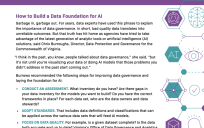Insights from Heidi Norman, Chief Information Officer and Director of the Department of Innovation & Performance, city of Pittsburgh
In late 2019, Pittsburgh, seeking to distinguish itself from other cities, applied for certification from Bloomberg Philanthropies’ What Works Cities Certification Program, which honors localities that effectively use data to increase economic mobility within their borders, protect public health, improve residents’ satisfaction and respond to crises, among other achievements. Pittsburgh was turned down — it met only four of the program’s 23 required criteria — but rather than walk away, thinking that certification was an impossible dream, the city dusted itself off and worked hard to change its entire data mindset. The city was certified in March 2022. Here’s how officials did it.
Find Partners and Learn Together
Staff in Pittsburgh CIO Heidi Norman’s department partnered with What Works Cities and with a program at Johns Hopkins University known as GovX, which helps cities overcome data hurdles. GovX is powered by a “proud team of data nerds” and guided by a fundamental belief that government can do amazing things for constituents when it knows how to properly use information.
Norman’s team also worked with colleagues in Pittsburgh’s Office of Management and Budget, which helps procure IT, and other groups.
“We would be sent through these educational programs, and then the team did something really cool: They used a very rapid build, measure, learn cycle,” Norman said during a recent GovLoop event. “They wrote me policies, they changed processes, they updated technical systems.”
Build on Momentum
And certification no longer became the end goal. In the same month that What Works Cities publicly certified Pittsburgh, Norman’s team formed and held an inaugural meeting of a data governance committee with data coordinators from every city department. “They all went to training camp…with the idea that in the next six months, we are going to have a full data dictionary for the entire city government. That’s pretty mind blowing,” Norman said.
Today, colleagues from other departments are trying to establish their own so-called Operation Performance Data Analysts to help them access, analyze and report on how their departments are doing. “Small changes can lead to really big changes and can create momentum that is then shared by leaders,” Norman said. “And now the departments are telling us to move faster. We’re having trouble keeping up with them. So that’s really pretty remarkable.”
A version of this article appeared in our guide, “Innovations 2022: Conversations That Matter. For more insights on how governments are embracing change, download the guide.





Leave a Reply
You must be logged in to post a comment.